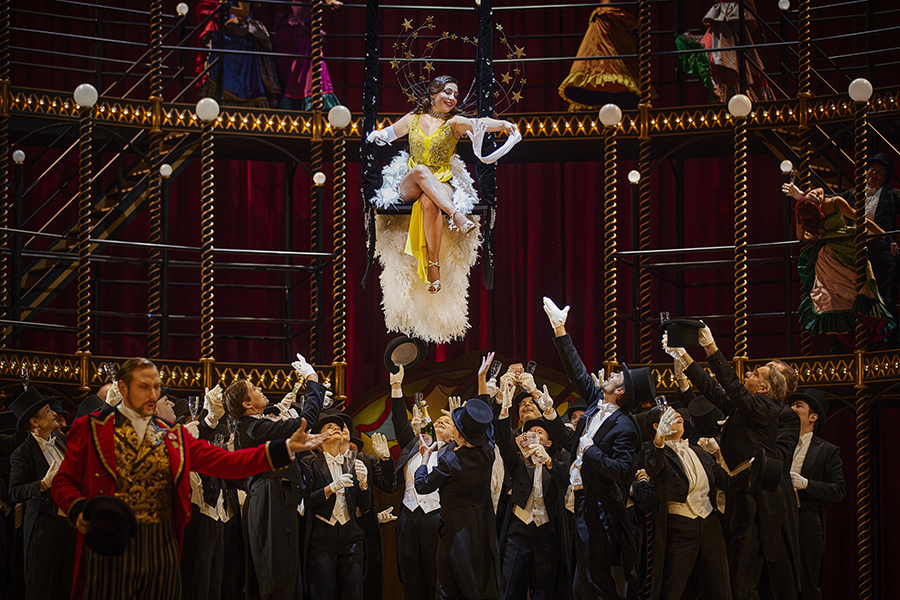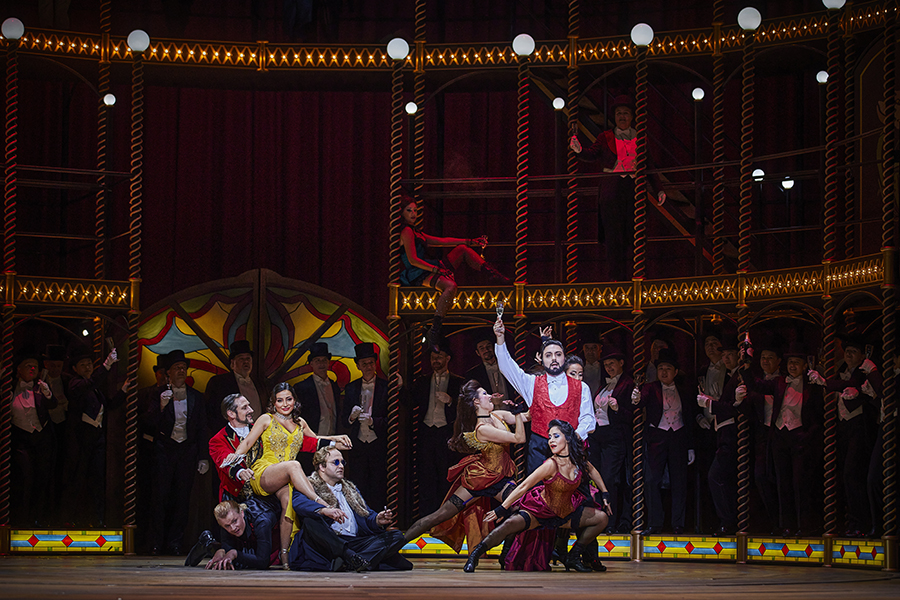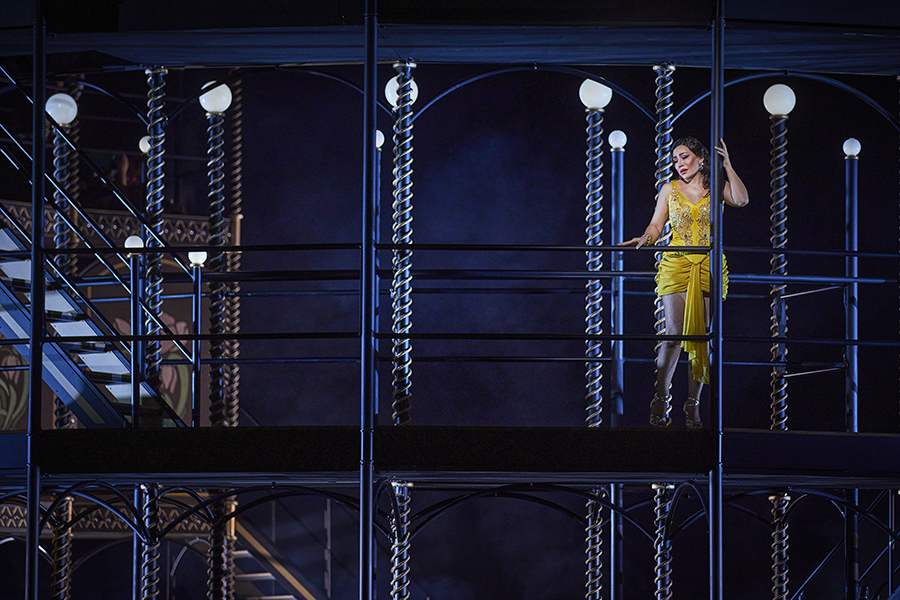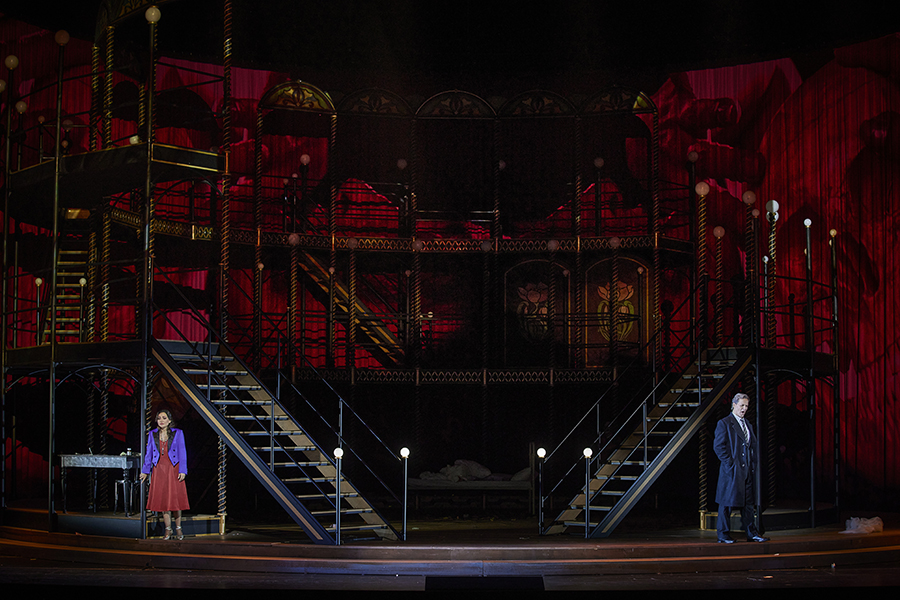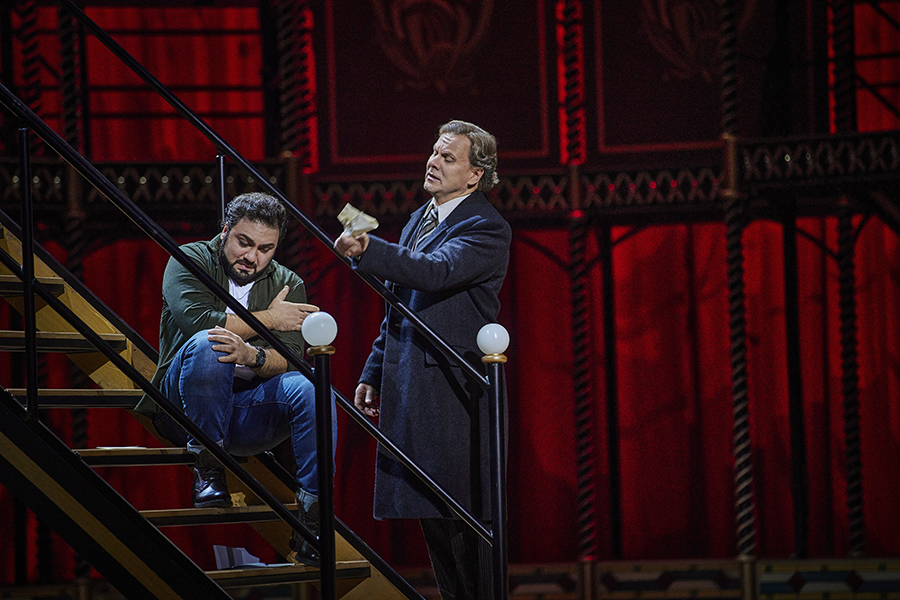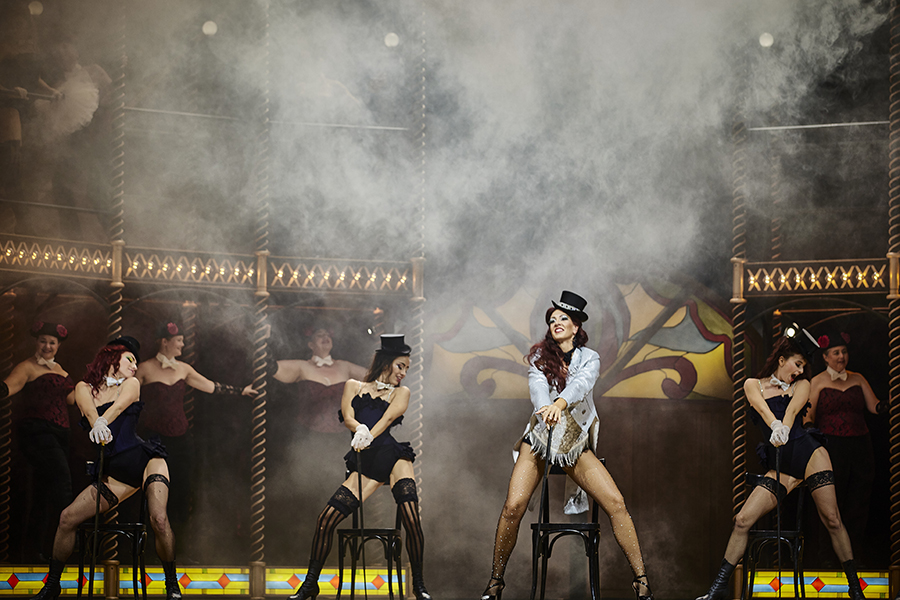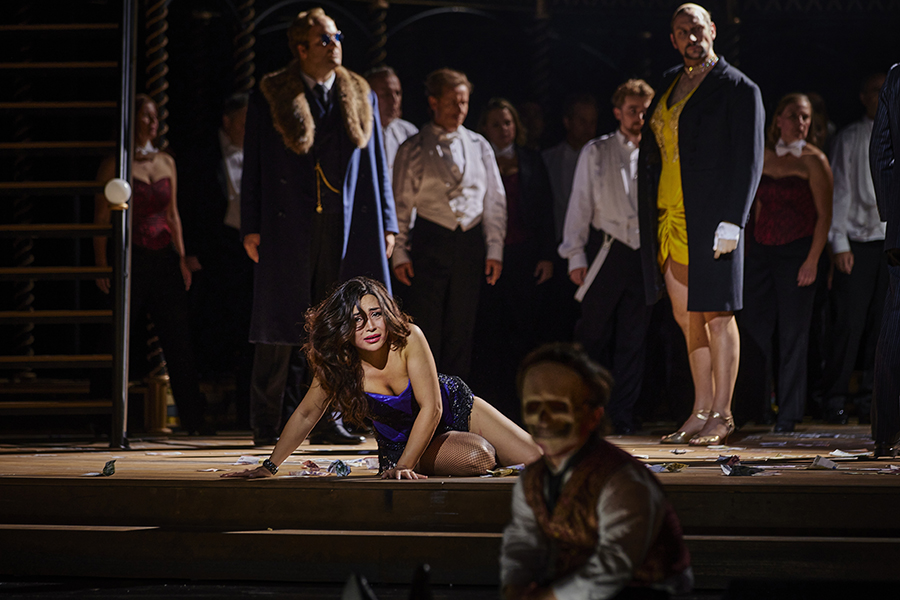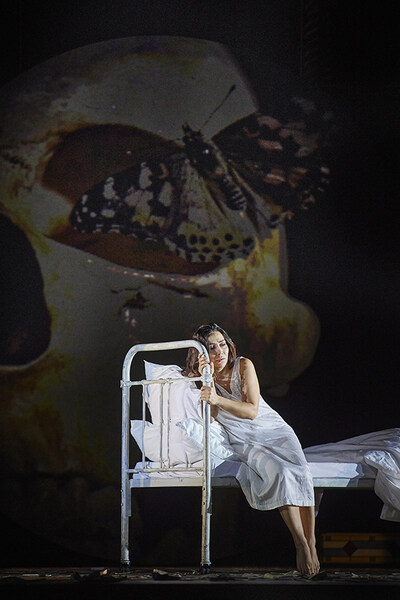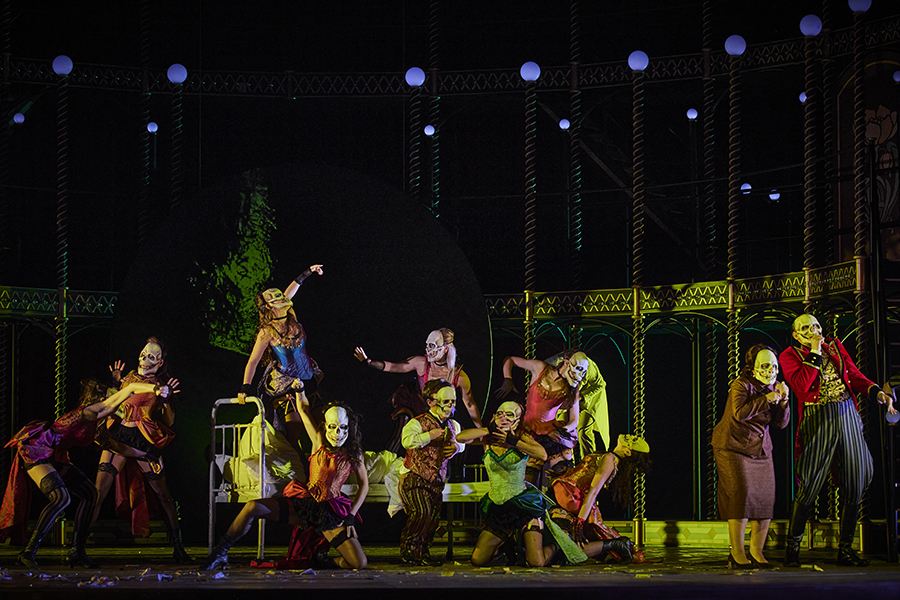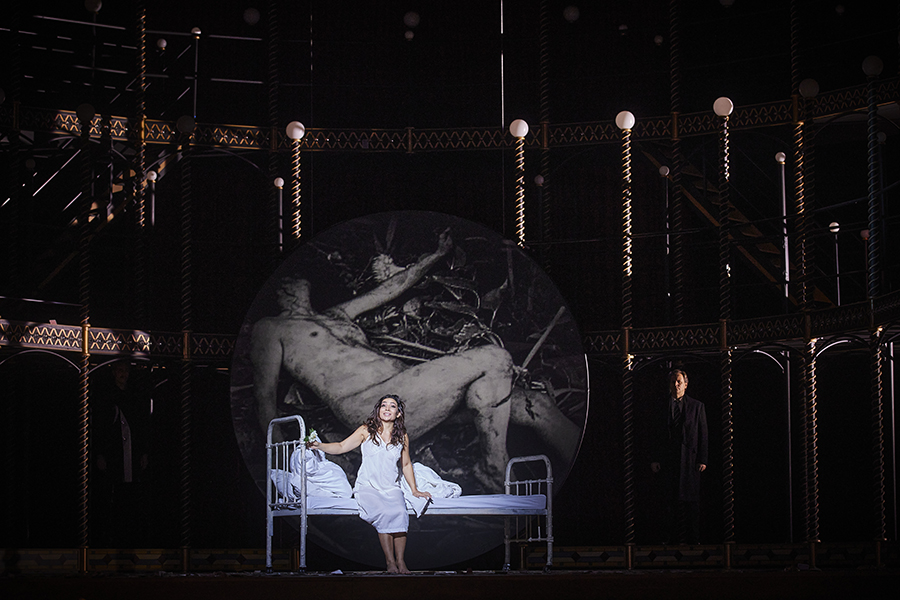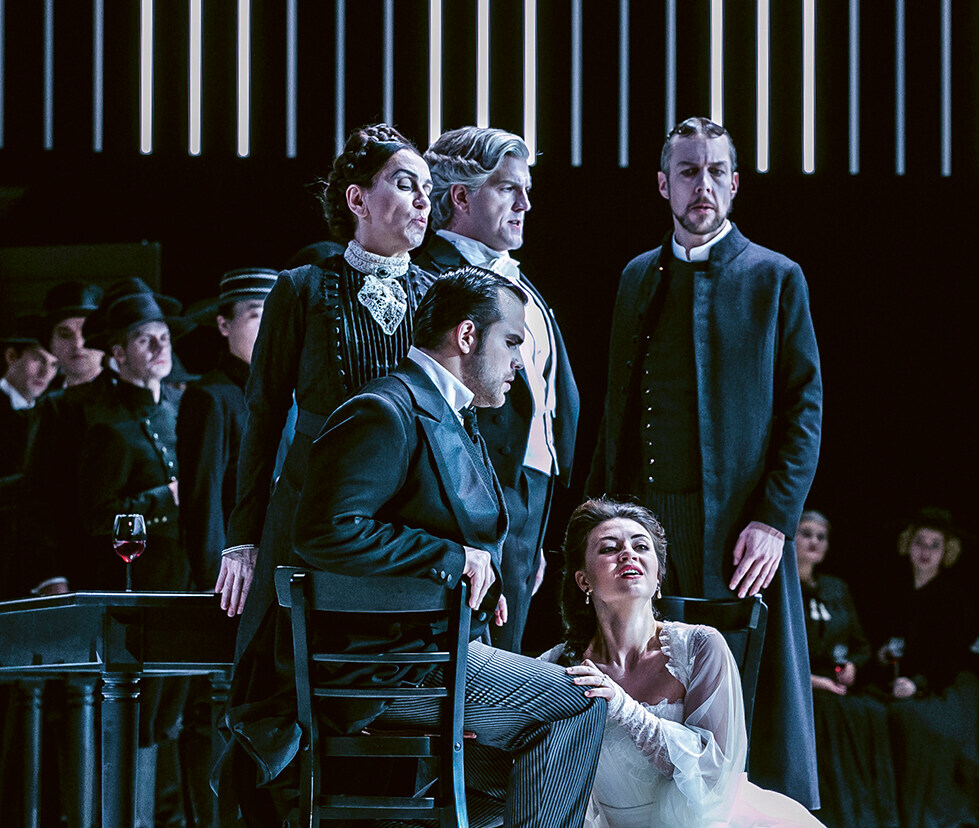Has pain ever sounded more beautiful than in Verdi’s La traviata?
Melodramma in three acts
Libretto by Francesco Maria Piave
Performed in Italian with German and English surtitles
Premiere
2. October 2022
Dates & Cast
- Conductor Gergely Kesselyák (09., 14., 16. November 2024), Stefano Ranzani (20., 23., 29. November 2024), Gaetano d’Espinosa (11., 15., 18., 22., 25. January 2025), Nicholas Carter (28. March, 02., 04. April 2026), Clelia Cafiero (09., 11., 17., 25., 28. April 2026)
- Staging Barbora Horáková
- Set Design Eva-Maria van Acker
- Costume Design Annemarie Bulla
- Lighting Design Fabio Antoci
- Video Sarah Derendinger
- Choreography Juanjo Arqués
- Choir Jan Hoffmann
- Dramaturgy Juliane Schunke
- Violetta Valéry Tuuli Takala (09., 14., 16., 20., 23., 29. November 2024), Emily Pogorelc (11., 15., 18., 22., 25. January 2025), Adela Zaharia (28. March, 02., 04., 09., 11., 17., 25., 28. April 2026)
- Alfredo Germont Piotr Buszewski (09., 14., 16., 20., 23., 29. November 2024), Bekhzod Davronov (11., 15., 18., 22., 25. January 2025), Amitai Pati (28. March, 02., 04., 09., 11., 17., 25., 28. April 2026)
- Giorgio Germont James Rutherford (09., 14., 16., 20., 23., 29. November 2024), Christoph Pohl (11., 15., 18., 22., 25. January 2025), George Gagnidze (28. March, 02., 04., 09., 11., 17., 25., 28. April 2026)
- Flora Bervoix Susan Zarrabi (09., 14. November 2024), Štěpánka Pučálková (16., 20., 23., 29. November 2024, 11., 15., 18., 22., 25. January 2025, 28. March, 02., 04., 09. April 2026), Winona Martin (25., 28. April 2026)
- Gastone Simeon Esper (09., 14., 16., 20., 23. November 2024, 11., 15., 18., 22., 25. January 2025), Patrick Vogel (29. November 2024), Raúl Gutiérrez (28. March, 02., 04., 09., 11., 17., 25., 28. April 2026)
- Barone Douphol Csaba Sándor (09., 14., 16., 20., 23., 29. November 2024, 11., 18., 22., 25. January 2025), Sebastian Wartig (15. January 2025), Danylo Matviienko (28. March, 02., 04., 09., 11., 17., 25., 28. April 2026)
- Marchese d'Obigny Vladyslav Buialskyi
- Dottore Grenvil Martin-Jan Nijhof
- Annina Fernanda Allande (09., 14., 16., 20., 23., 29. November 2024, 11., 15., 18., 22., 25. January 2025), Natasha Gesto (28. March, 02., 04., 09., 11., 17., 25., 28. April 2026)
- Giuseppe, Diener Violettas Ingolf Stollberg-da Silva (09., 16., 23. November 2024, 11., 18., 25. January 2025, 28. March, 02., 04., 09., 11., 17., 25., 28. April 2026), Frank Blümel (14., 20., 29. November 2024, 15., 22. January 2025, 28. March, 02., 04., 09., 11., 17., 25., 28. April 2026)
- Diener Floras Wooram Lim (09., 16., 23. November 2024, 11., 18., 25. January 2025, 28. March, 02., 04., 09., 11., 17., 25., 28. April 2026), Reinhold Schreyer-Morlock (14., 20., 29. November 2024, 15., 22. January 2025, 28. March, 02., 04., 09., 11., 17., 25., 28. April 2026)
- Dienstbote Alexander Födisch (09., 16., 23. November 2024, 11., 18., 25. January 2025, 28. March, 02., 04., 09., 11., 17., 25., 28. April 2026), Holger Steinert (14., 20., 29. November 2024, 15., 22. January 2025, 28. March, 02., 04., 09., 11., 17., 25., 28. April 2026)
- Conférencier Anton Wagner
- Conductor Nicholas Carter
- Staging Barbora Horáková
- Set Design Eva-Maria van Acker
- Costume Design Annemarie Bulla
- Lighting Design Fabio Antoci
- Video Sarah Derendinger
- Choreography Juanjo Arqués
- Choir Jan Hoffmann
- Dramaturgy Juliane Schunke
Generously supported by the Semperoper Foundation
- Violetta Valéry Adela Zaharia
- Alfredo Germont Amitai Pati
- Giorgio Germont George Gagnidze
- Flora Bervoix Štěpánka Pučálková
- Gastone Raúl Gutiérrez
- Barone Douphol Danylo Matviienko
- Marchese d'Obigny Vladyslav Buialskyi
- Dottore Grenvil Martin-Jan Nijhof
- Annina Natasha Gesto
- Giuseppe, Diener Violettas Frank Blümel, Ingolf Stollberg-da Silva
- Diener Floras Wooram Lim, Reinhold Schreyer-Morlock
- Dienstbote Alexander Födisch, Holger Steinert
- Conductor Nicholas Carter
- Staging Barbora Horáková
- Set Design Eva-Maria van Acker
- Costume Design Annemarie Bulla
- Lighting Design Fabio Antoci
- Video Sarah Derendinger
- Choreography Juanjo Arqués
- Choir Jan Hoffmann
- Dramaturgy Juliane Schunke
Generously supported by the Semperoper Foundation
- Violetta Valéry Adela Zaharia
- Alfredo Germont Amitai Pati
- Giorgio Germont George Gagnidze
- Flora Bervoix Štěpánka Pučálková
- Gastone Raúl Gutiérrez
- Barone Douphol Danylo Matviienko
- Marchese d'Obigny Vladyslav Buialskyi
- Dottore Grenvil Martin-Jan Nijhof
- Annina Natasha Gesto
- Giuseppe, Diener Violettas Frank Blümel, Ingolf Stollberg-da Silva
- Diener Floras Wooram Lim, Reinhold Schreyer-Morlock
- Dienstbote Alexander Födisch, Holger Steinert
- Conductor Nicholas Carter
- Staging Barbora Horáková
- Set Design Eva-Maria van Acker
- Costume Design Annemarie Bulla
- Lighting Design Fabio Antoci
- Video Sarah Derendinger
- Choreography Juanjo Arqués
- Choir Jan Hoffmann
- Dramaturgy Juliane Schunke
Generously supported by the Semperoper Foundation
- Violetta Valéry Adela Zaharia
- Alfredo Germont Amitai Pati
- Giorgio Germont George Gagnidze
- Flora Bervoix Štěpánka Pučálková
- Gastone Raúl Gutiérrez
- Barone Douphol Danylo Matviienko
- Marchese d'Obigny Vladyslav Buialskyi
- Dottore Grenvil Martin-Jan Nijhof
- Annina Natasha Gesto
- Giuseppe, Diener Violettas Frank Blümel, Ingolf Stollberg-da Silva
- Diener Floras Wooram Lim, Reinhold Schreyer-Morlock
- Dienstbote Alexander Födisch, Holger Steinert
- Conductor Clelia Cafiero
- Staging Barbora Horáková
- Set Design Eva-Maria van Acker
- Costume Design Annemarie Bulla
- Lighting Design Fabio Antoci
- Video Sarah Derendinger
- Choreography Juanjo Arqués
- Choir Jan Hoffmann
- Dramaturgy Juliane Schunke
Generously supported by the Semperoper Foundation
- Violetta Valéry Adela Zaharia
- Alfredo Germont Amitai Pati
- Giorgio Germont George Gagnidze
- Flora Bervoix Štěpánka Pučálková
- Gastone Raúl Gutiérrez
- Barone Douphol Danylo Matviienko
- Marchese d'Obigny Vladyslav Buialskyi
- Dottore Grenvil Martin-Jan Nijhof
- Annina Natasha Gesto
- Giuseppe, Diener Violettas Frank Blümel, Ingolf Stollberg-da Silva
- Diener Floras Wooram Lim, Reinhold Schreyer-Morlock
- Dienstbote Alexander Födisch, Holger Steinert
- Conductor Clelia Cafiero
- Staging Barbora Horáková
- Set Design Eva-Maria van Acker
- Costume Design Annemarie Bulla
- Lighting Design Fabio Antoci
- Video Sarah Derendinger
- Choreography Juanjo Arqués
- Choir Jan Hoffmann
- Dramaturgy Juliane Schunke
Generously supported by the Semperoper Foundation
- Violetta Valéry Adela Zaharia
- Alfredo Germont Amitai Pati
- Giorgio Germont George Gagnidze
- Gastone Raúl Gutiérrez
- Barone Douphol Danylo Matviienko
- Marchese d'Obigny Vladyslav Buialskyi
- Dottore Grenvil Martin-Jan Nijhof
- Annina Natasha Gesto
- Giuseppe, Diener Violettas Frank Blümel, Ingolf Stollberg-da Silva
- Diener Floras Wooram Lim, Reinhold Schreyer-Morlock
- Dienstbote Alexander Födisch, Holger Steinert
- Conductor Clelia Cafiero
- Staging Barbora Horáková
- Set Design Eva-Maria van Acker
- Costume Design Annemarie Bulla
- Lighting Design Fabio Antoci
- Video Sarah Derendinger
- Choreography Juanjo Arqués
- Choir Jan Hoffmann
- Dramaturgy Juliane Schunke
Generously supported by the Semperoper Foundation
- Violetta Valéry Adela Zaharia
- Alfredo Germont Amitai Pati
- Giorgio Germont George Gagnidze
- Gastone Raúl Gutiérrez
- Barone Douphol Danylo Matviienko
- Marchese d'Obigny Vladyslav Buialskyi
- Dottore Grenvil Martin-Jan Nijhof
- Annina Natasha Gesto
- Giuseppe, Diener Violettas Frank Blümel, Ingolf Stollberg-da Silva
- Diener Floras Wooram Lim, Reinhold Schreyer-Morlock
- Dienstbote Alexander Födisch, Holger Steinert
In brief
»La traviata«–directly translated as »the one who has lost her way«–is, of course, the Parisian courtesan Violetta Valéry. Already dying from an incurable lung disease, she falls in love with Alfredo Germont. Yet her feelings are in conflict with her way of life and all sense of reason; ultimately, her quest for freedom and happiness is defeated by the moral strictures of bourgeois society. When first performed in Venice in 1853, this story was considered scandalous: an opera about a courtesan who dies of tuberculosis and is also modelled on a real-life woman in Parisian society was an outrageous inno-vation for the time. Focusing on the complex relationship between Violetta, her lover Alfredo and his father Giorgio, Giuseppe Verdi created a captivating and fully-rounded character, expressed through music that shifts between lyrical bel canto passages and powerful musico-dramatic outbursts. Director Barbora Horáková Joly places »La traviata« in the dazzling world of 19th-century vaudeville.
Storyline
Act one
Violetta Valéry is one of the most beautiful and most adored ladies in the Parisian demi-monde, who gives lavish parties in her salon and celebrates life itself. The young Alfredo Germont is also present at one of these celebrations and is asked by the hostess to offer a toast. He sings the praises of love, but is unable to impress Violetta much at first. She finds her greatest happiness in sensory indulgence and other simple pleasures of life. When the company rise to dance, Violetta, who is suffering from consumption, has a fainting spell and is forced to stay behind. Alfredo remains with her and declares his love for her. He asks her when he can come back, and Violetta gives him her favorite flower, a camellia. She tells Alfred to come back when the flower has withered. When he has gone, Violetta is left alone with her conflicting feelings. On the one hand, she loves this life of pleasure and freedom, but at the same time longs for a close bond with a person and a life away from the superficial Parisian society.
Act two
Violetta and Alfredo have become a couple and they are enjoying a happy time in the countryside near Paris. Alfredo learns from Annina, Violetta’s servant, that Violetta intends to sell valuables in order to further finance their happiness together at the country home. Alfredo decides to travel to Paris himself to find the necessary money. As soon as he is gone, a man appears in Violetta’s house whom she initially takes to be the buyer of her country home and who reveals himself to be Alfredo’s father, Giorgio Germont. Giorgio forcefully demands that Violetta end her love affair with his son. Alfredo’s sister’s groom threatens to break off their engagement if Alfredo doesn’t separate from her. Violetta decides to sacrifice her own happiness for someone else’s. When Alfredo returns, she evades him and secretly leaves for Paris, reappearing in society that evening at her friend Flora’s ball. She sends Alfredo a letter telling him that she has decided to break up with him. Alfredo is stunned. When he finds Flora’s invitation, he too, enraged with jealousy, sets out for Paris in order to confront Violetta. He meets her at the ball side by side with her former lover, Baron Douphol, whom she pretends to love dearly. Alfredo challenges the baron to a duel and, in front of the guests, throws a wad of money in Violetta’s face as payment for her »priceless services«. Violetta collapses. All protestations of her love for Alfredo and Alfredo’s rebuke by his father are in vain. After the duel with Douphol, Alfredo has to flee abroad.
Act three
Violetta’s will to live is broken. Alone and dying, she lives in her Paris apartment. When Alfredo learns from his father the real reasons behind Violetta’s separation, he immediately hurries back to Paris to her sickbed. In despair, he asks her forgiveness. Overwhelmed by his love, Violetta recovers for a moment. But it is too late. As a farewell, she hands him a locket with her picture on it and dies in his arms. Alfredo remains with his father in remorse and despair.
Explore
La traviata
La traviata – Addio del passato
La traviata – Violetta in the cabaret
La traviata – Violetta’s story
